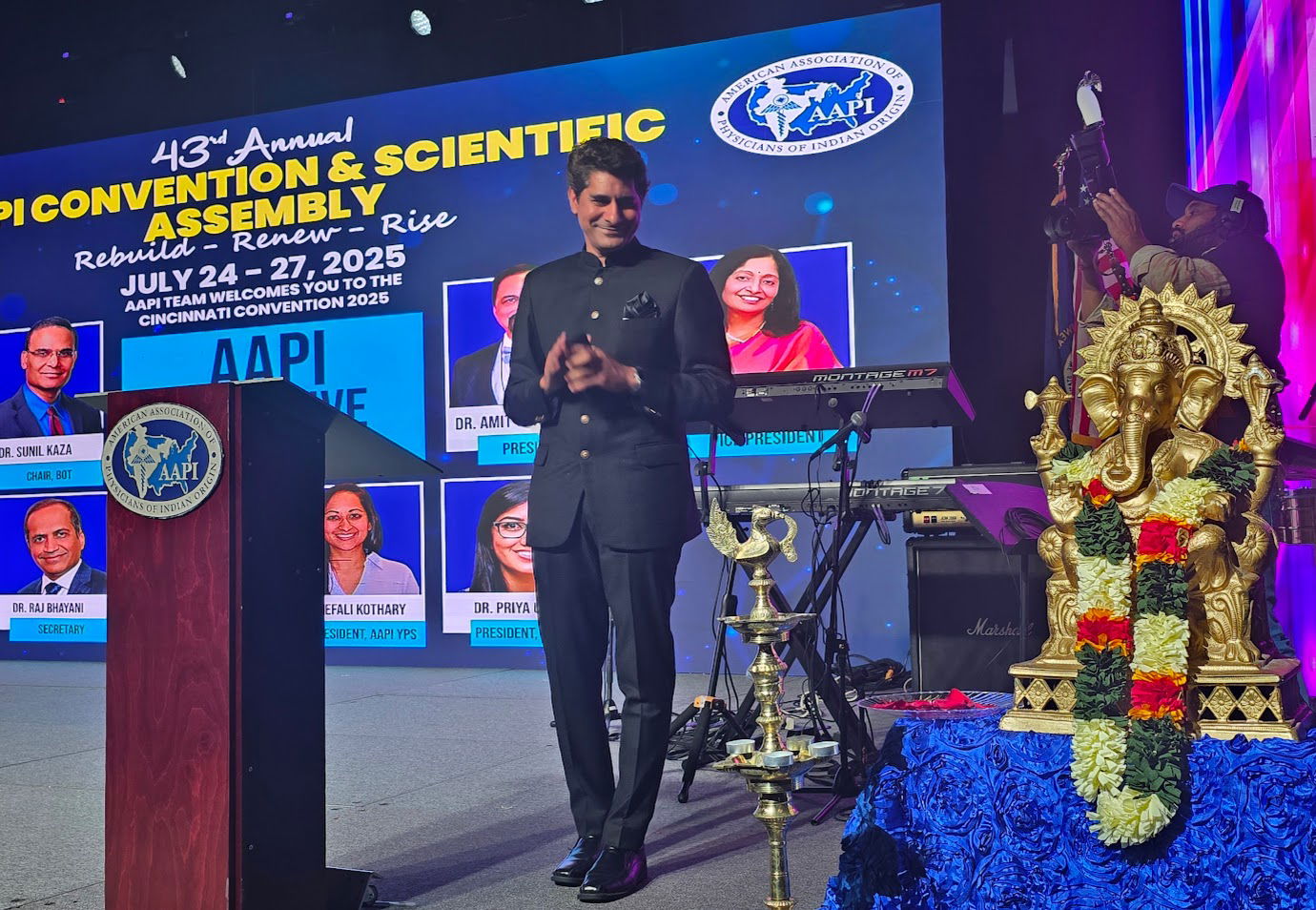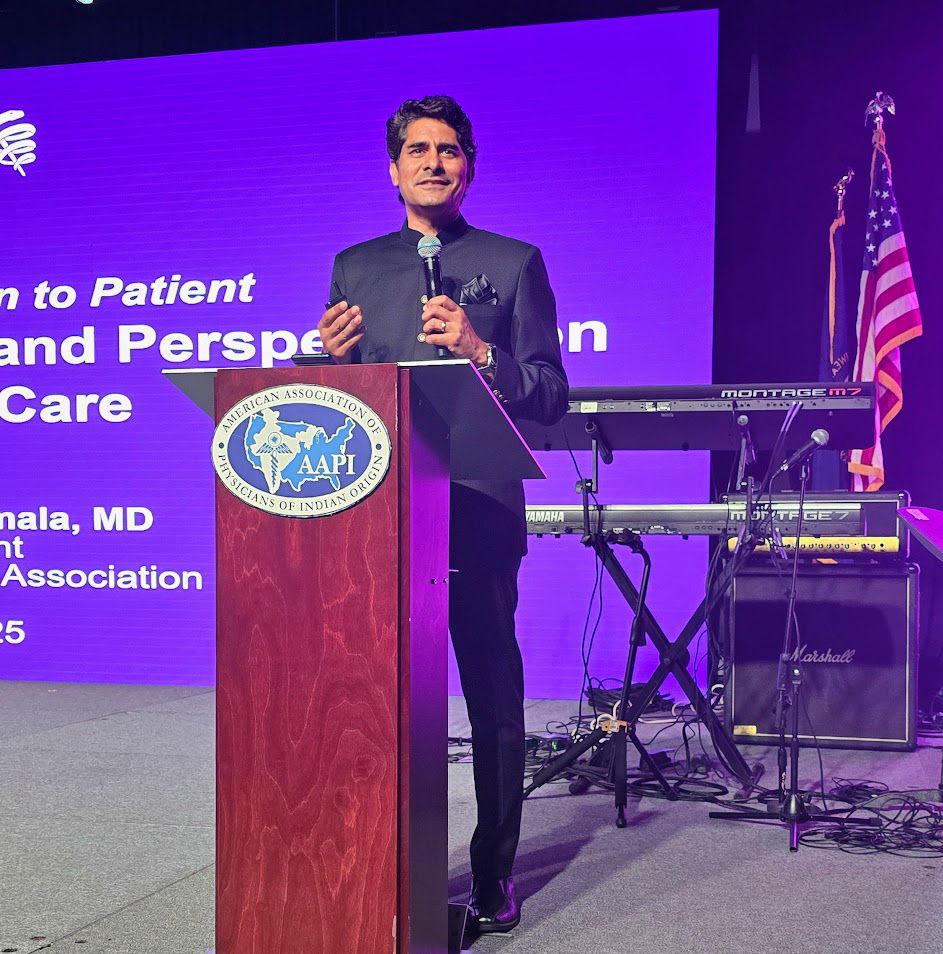America
Dr. Bobby Mukkamala, AMA President, Appeals for Health Care Reform, Equity, and Physician Support

July 31 :
In a deeply moving and wide-ranging keynote address at a recent national healthcare advocacy conference, Dr. Bobby Mukkamala, President of the American Medical Association (AMA) delivered an urgent and reflective call for unity, reform, and equity throughout the U.S. health system. Drawing from personal experiences both as a physician and as a patient, the AMA President wove together stories of family, professional dedication, and the stark realities of American healthcare, galvanizing colleagues and policymakers with both candor and vision.
In his keynote address at the 43rd annual Convention of the Physicians of Indian Origin (AAPI) at the iconic Cincinnati Marriott at RiverCenter and Northern Kentucky Convention Center, Cincinnati, OH on Saturday, July 26th, 2025, Dr. Mukkamala celebrated the rapid expansion of telehealth and digital health, noting, “That was an amazing silver lining during covid, that we were able to take care of our patients via telemedicine, and that's something that we want to continue to have that be an option there.”

During a solemn ceremony Dr. Satheesh Kathula, the outgoing President of AAPI passed on the gavel to Dr. Amit Chakrabarty during the Gala on Saturday night at the end of the convention, marking a new chapter of service, collaboration, and vision. The event brought together hundreds of members of AAPI, past leaders, and incoming officers, symbolizing unity and a shared commitment to elevating the voice of Indian-origin physicians across the U.S. Dr. Bobby Mukkamala made a history by being elected as the American Medical Association’s first President of Indian origin in its 178-year history. He is the first physician of Indian heritage to lead the influential organization. Mukkamala’s appointment came just months after he had surgery to remove an 8-cm brain tumor.
As the first Indian American president of the AMA, Dr. Mukkamala acknowledged both the honor and the challenge, stating, “There's never been an Indian president of the American Medical Association… 10% of the doctors in this country are like you and me. We have an enormous ability, an enormous responsibility, to improve the healthcare of this country.” He noted with concern that “The AMA represents all physicians in this country. 20% of those physicians are members of the AMA… 2% of the Indian physicians in this country are members of the AMA. That is a problem, and so I think we can do better to be unified, to be the left hand and the right hand of healthcare in this country.”
The Indispensable Role of International Medical Graduates A significant portion of the speech focused on the critical contributions of international medical graduates (IMGs). In the President’s hometown of Flint, Michigan, “Were it not for IMGs, we would lose 75% of the doctors in Flint, Michigan. And what is the consequence of that, the people will get sick when that illness could have been prevented. People will die when that death could have been prevented, and that's because of IMGs.”

The President of AMA highlighted recent advocacy for the protection of J-1 visa holders, noting, “This is exactly when the AMA sent a note to Washington, DC, to this administration, saying You cannot do this to J-1 visa holders who are starting a design. This is exactly what the AMA does. And we do this every day, right?”
The AMA’s work to “preserve the ability of international medical graduates to come to this country with an open door like my parents came in 1970 when we needed them badly was described as critical.”
Championing Equity, Diversity, and Social Justice:
Dr. Mukkamala did not shy away from challenging conversations about race and community. Reflecting on experiences growing up as an immigrant in Michigan, the President of AMA recalled, “My nickname was brownie. And I had no idea that that was something that was kind of, you know, a little racist, things like that. I thought it was kind of funny. I thought maybe it's because I was sweet, because I tasted like brownies. But no.” The family faced discrimination even in purchasing a home: “He had to call the FBI because we got death threats in 1987...because this was the nature of the city at that time. This was the nature of the country at that time.”
IMA’s advocacy extends to social justice, as seen in the response to the murder of George Floyd: “What I tell people is that there's a risk to being a leader, to pursue things like diversity or equity in our country… If our passion is for allowing this country to be an open door to international medical graduates, particularly from my country of origin, India. If that is the passion, this is the organization that we should work with to make that happen. Absolutely.”
A Call to Action: “We must stand together.”
The address closed with a plea for engagement and unity: “Please don't join because of me. Please join because of the importance to the health care of our country, with the perspective of people that have their roots in India, that is critical. And so the AMA recognizes the importance of Indian physicians… We represent everybody, but only 20% are members. Look at the next 2% of the Indian physicians in this country are members of the AMA. That is a problem, and so I think we can do better to be unified.”
About the AMA
The American Medical Association remains the nation’s largest professional association for physicians, dedicated to the advancement of medical science, advocacy for patient and physician rights, and the improvement of public health.
With heartfelt storytelling and a clear policy agenda, Dr. Mukkamala’s keynote became a rallying cry for all stakeholders to work together for a more just, effective, and inclusive healthcare future: “AMA cannot do it alone; we must stand together.”
About AAPI
Serving 1 in every 7 patients in the US, AAPI members care for millions of patients every day, while several of them have risen to hold high-flying jobs, shaping the policies and programs, and inventions that shape the landscape of healthcare in the US and around the world.
Since its inception in 1982, AAPI has been at the forefront, representing a conglomeration of more than 125,000 practicing physicians in the United States, seeking to be the united voice for the physicians of Indian origin. For more information on AAPI and its programs and initiatives, please visit: www.aapiusa.org



































